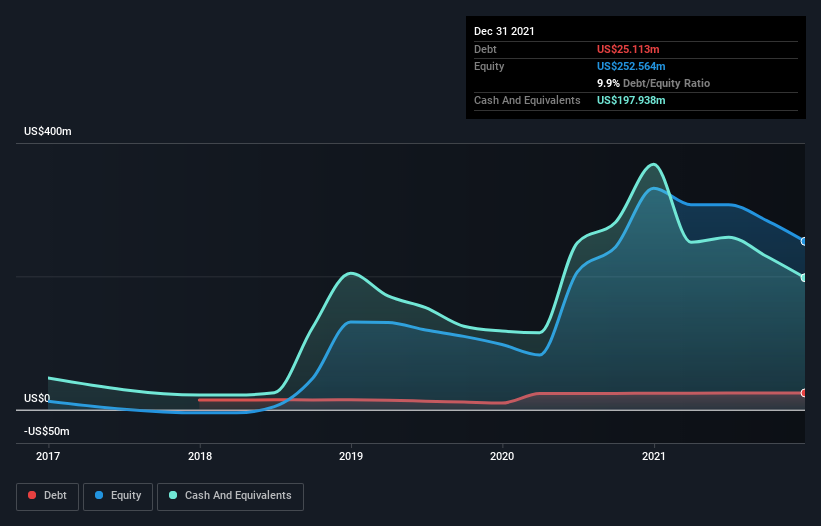Warren Buffett famously said, 'Volatility is far from synonymous with risk.' When we think about how risky a company is, we always like to look at its use of debt, since debt overload can lead to ruin. As with many other companies Sutro Biopharma, Inc. (NASDAQ:STRO) makes use of debt. But is this debt a concern to shareholders?
When Is Debt A Problem?
Debt is a tool to help businesses grow, but if a business is incapable of paying off its lenders, then it exists at their mercy. If things get really bad, the lenders can take control of the business. While that is not too common, we often do see indebted companies permanently diluting shareholders because lenders force them to raise capital at a distressed price. By replacing dilution, though, debt can be an extremely good tool for businesses that need capital to invest in growth at high rates of return. The first thing to do when considering how much debt a business uses is to look at its cash and debt together.
See our latest analysis for Sutro Biopharma
What Is Sutro Biopharma's Debt?
As you can see below, Sutro Biopharma had US$25.1m of debt, at December 2021, which is about the same as the year before. You can click the chart for greater detail. But it also has US$197.9m in cash to offset that, meaning it has US$172.8m net cash.

A Look At Sutro Biopharma's Liabilities
We can see from the most recent balance sheet that Sutro Biopharma had liabilities of US$41.7m falling due within a year, and liabilities of US$47.1m due beyond that. Offsetting these obligations, it had cash of US$197.9m as well as receivables valued at US$12.5m due within 12 months. So it actually has US$121.5m more liquid assets than total liabilities.
This surplus liquidity suggests that Sutro Biopharma's balance sheet could take a hit just as well as Homer Simpson's head can take a punch. With this in mind one could posit that its balance sheet means the company is able to handle some adversity. Simply put, the fact that Sutro Biopharma has more cash than debt is arguably a good indication that it can manage its debt safely. The balance sheet is clearly the area to focus on when you are analysing debt. But ultimately the future profitability of the business will decide if Sutro Biopharma can strengthen its balance sheet over time. So if you're focused on the future you can check out this free report showing analyst profit forecasts.
In the last year Sutro Biopharma wasn't profitable at an EBIT level, but managed to grow its revenue by 45%, to US$62m. Shareholders probably have their fingers crossed that it can grow its way to profits.
So How Risky Is Sutro Biopharma?
By their very nature companies that are losing money are more risky than those with a long history of profitability. And in the last year Sutro Biopharma had an earnings before interest and tax (EBIT) loss, truth be told. And over the same period it saw negative free cash outflow of US$97m and booked a US$106m accounting loss. However, it has net cash of US$172.8m, so it has a bit of time before it will need more capital. With very solid revenue growth in the last year, Sutro Biopharma may be on a path to profitability. Pre-profit companies are often risky, but they can also offer great rewards. When analysing debt levels, the balance sheet is the obvious place to start. However, not all investment risk resides within the balance sheet - far from it. For instance, we've identified 3 warning signs for Sutro Biopharma (1 is a bit unpleasant) you should be aware of.
If you're interested in investing in businesses that can grow profits without the burden of debt, then check out this free list of growing businesses that have net cash on the balance sheet.
New: Manage All Your Stock Portfolios in One Place
We've created the ultimate portfolio companion for stock investors, and it's free.
• Connect an unlimited number of Portfolios and see your total in one currency
• Be alerted to new Warning Signs or Risks via email or mobile
• Track the Fair Value of your stocks
Have feedback on this article? Concerned about the content? Get in touch with us directly. Alternatively, email editorial-team (at) simplywallst.com.
This article by Simply Wall St is general in nature. We provide commentary based on historical data and analyst forecasts only using an unbiased methodology and our articles are not intended to be financial advice. It does not constitute a recommendation to buy or sell any stock, and does not take account of your objectives, or your financial situation. We aim to bring you long-term focused analysis driven by fundamental data. Note that our analysis may not factor in the latest price-sensitive company announcements or qualitative material. Simply Wall St has no position in any stocks mentioned.
About NasdaqGM:STRO
Moderate risk and fair value.
Market Insights
Community Narratives



